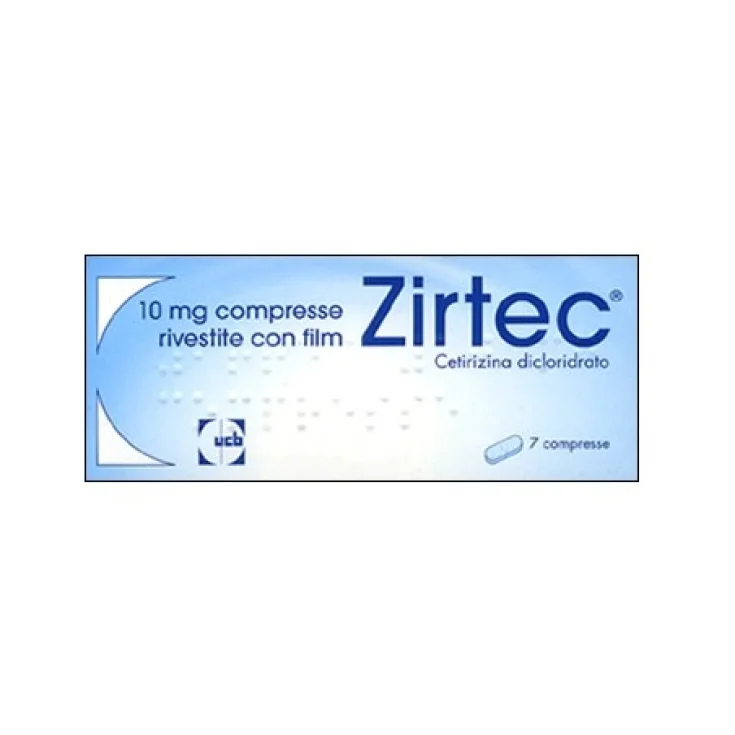Zirtec 7 Coated Tablets 10 mg

- Brand: UCB PHARMA SpA
- Product Code: 026894042
- EAN:
- Availability: In Stock (evaso in 24 ore)
- 3 items
for 7,48€ each - 4 items
for 7,32€ each - 5 items
for 7,17€ each
Zirtec Coated Tablets
What contraindications does Zirtec tablets have
Warnings and precautions when using Zirtec
Undesirable effects with the use of Zirtec
Zirtec in Pregnancy and breastfeeding
What is Zirtec for?
Tablets for adults and pediatric patients from 6 years of age: - Cetirizine is indicated for the treatment of nasal and ocular symptoms of seasonal and perennial allergic rhinitis. - Cetirizine is indicated for the symptomatic treatment of chronic idiopathic urticaria.
Composition of zirtec tablets
One film-coated tablet contains 10 mg of cetirizine dihydrochloride Excipients with known effect: one film-coated tablet contains 66.40 mg of lactose monohydrate
Excipients of Zirtec
- Microcrystalline cellulose - Lactose monohydrate - Colloidal anhydrous silica - Magnesium stearate - Opadry Y – 1–7000 which consists of: - Hydroxypropylmethylcellulose (E 464) - Titanium dioxide (E 171) - Macrogol 400
What contraindications does Zirtec tablets have?
These tablets can lead to hypersensitivity to the active substance, to any of the excipients listed in section 6.1, to hydroxyzine or to any derivative of piperazine. Patients with severe renal insufficiency with creatinine clearance less than 10 ml / min.
Posology Zirtec tablets
Posology Children aged 6 to 12 years 5 mg twice a day (half tablet twice a day). Adults and adolescents over 12 years of age 10 mg once daily (1 tablet). Elderly patients Based on available data, no dose reduction is required in elderly subjects with normal renal function. Patients with moderate to severe renal insufficiency There are no data available documenting the efficacy / safety ratio in patients with renal insufficiency. Since cetirizine is predominantly excreted via the kidney (see section 5.2), in cases where alternative treatments cannot be used, the dose intervals should be individualized according to renal function. Refer to the following table and adjust the dose as indicated. To use this dosing table, an estimate of the patient's creatinine clearance (CLcr) in ml / min is required. CLcr (ml / min) can be obtained from the serum creatinine value (mg / dl) using the following formula:
| CLcr = | [140– age (years)] x weight (kg) | (x 0.85 for women) |
| 72 x serum creatinine (mg / dL) |
Dosage adjustment for adults with impaired renal function
| Group | Creatinine clearance (ml / min) | Dosage and frequency |
| Normal | ≥80 | 10 mg once a day |
| Mild | 50 - 79 | 10 mg once a day |
| Moderate | 30 - 49 | 5 mg once a day |
| Serious | <30 | 5 mg once every 2 days |
| End-stage renal disease - Patients on dialysis | <10 | Contraindicated |
In pediatric patients with renal insufficiency, the dose will have to be individually adjusted taking into account the renal clearance, age and body weight of the patient. Patients with hepatic insufficiency Patients with hepatic insufficiency only do not require any dosage adjustments. Patients with hepatic and renal insufficiency Adjustment of the dosage is recommended (see Patients with moderate to severe renal insufficiency above). Method of administration The tablets should be taken with a glass of liquid.
Warnings and precautions when using Zirtec
At therapeutic doses, there was no evidence of clinically significant interactions with alcohol (for blood alcohol levels of 0.5 g / l). However, caution is advised in case of concomitant alcohol intake. Caution should be exercised in patients with predisposing factors for urinary retention (e.g. spinal cord injury, prostatic hyperplasia) as cetirizine may increase the risk of urinary retention. Caution is advised in epileptic patients and in patients at risk for seizures. Allergy skin tests are inhibited by antihistamines and a wash-out period (3 days) is required before performing them. Patients with rare hereditary problems of galactose intolerance, the Lapp lactase deficiency or glucose-galactose malabsorption should not take cetirizine film-coated tablets. Pediatric population The use of the film-coated tablet formulation is not recommended in children below 6 years of age as this formulation does not allow for appropriate dose adjustment.
Zinterc Interactions
Due to the pharmacokinetic, pharmacodynamic and tolerability profile of cetirizine, no interactions are expected with this antihistamine. In drug-drug interaction studies, in fact, neither pharmacodynamic nor significant pharmacokinetic interactions were reported, in particular with pseudoephedrine or theophylline (400 mg / day). The degree of absorption of cetirizine is not reduced by food; although the rate of absorption decreased.
Undesirable effects with the use of Zirtec
Clinical studies have shown that cetirizine at the recommended dosage has minor CNS undesirable effects, including somnolence, fatigue, dizziness and headache. In some cases, paradoxical CNS stimulation has been reported. Although cetirizine is a selective antagonist of peripheral H1 receptors and is relatively devoid of anticholinergic activity, isolated cases of micturition difficulty, visual accommodation disturbances and dry mouth have been reported. There have been reports of abnormal liver function with elevated liver enzyme levels accompanied by elevated bilirubin, most of which resolved following discontinuation of cetirizine dihydrochloride. Clinical trials In double-blind controlled clinical trials comparing cetirizine versus placebo or other antihistamines at the recommended dosage (10 mg per day for cetirizine), for which quantitative safety data are available, to cetirizine more than 3200 subjects. Based on these data, the following adverse reactions were reported with an incidence of 1.0% or greater with cetirizine 10 mg in placebo-controlled trials:
| Adverse reactions (WHO – ART) | Cetirizine 10 mg (n = 3260) | Placebo (n = 3061) |
| Organism as a whole - systemic pathologies | ||
| Fatigue | 1.63% | 0.95% |
| Central and peripheral nervous system disorders | ||
| Dizziness | 1.10% | 0.98% |
| Headache | 7.42% | 8.07% |
| Gastrointestinal disorders | ||
| Abdominal pain | 0.98% | 1.08% |
| Dry mouth | 2.09% | 0.82% |
| Nausea | 1.07% | 1.14% |
| Psychiatric disorders | ||
| Drowsiness | 9.63% | 5.00% |
| Respiratory pathologies | ||
| Pharyngitis | 1.29% | 1.34% |
Although statistically the incidence of somnolence is more common than with placebo, this event was mild to moderate in the majority of cases. Further studies in which objective tests have been carried out have shown that usual daily activities are not compromised at the recommended daily dose in young healthy volunteers. Adverse reactions with an incidence of 1.0% or greater in children aged 6 months to 12 years in placebo-controlled clinical trials are:
| Adverse reactions (WHO – ART) | Cetirizine (n = 1656) | Placebo (n = 1294) |
| Gastrointestinal disorders | ||
| Diarrhea | 1.0% | 0.6% |
| Psychiatric disorders | ||
| Drowsiness | 1.8% | 1.4% |
| Respiratory pathologies | ||
| Rhinitis | 1.4% | 1.1% |
| Organism as a whole - systemic pathologies | ||
| Fatigue | 1.0% | 0.3% |
Post-marketing experience In addition to the adverse reactions from clinical trials listed in the previous section, the following undesirable effects have been reported during post-marketing experience. Undesirable effects are described according to MedDRA by system organ class and according to the frequency defined based on post-marketing experience. Frequencies are defined as follows: very common (≥1 / 10); common (≥1 / 100 to <1/10); uncommon (≥1 / 1000 to <1/100); rare (≥1 / 10,000, <1/1000); very rare (<1 / 10,000), not known (cannot be estimated from the available data). Blood and lymphatic system disorders: Very rare: thrombocytopenia Immune system disorders : Rare: hypersensitivity Very rare: anaphylactic shock Metabolism and nutrition disorders : Not known: increased appetite Psychiatric disorders : Uncommon: agitation Rare: aggression, confusion, depression , hallucinations, insomnia Very rare: tic Not known: suicidal ideation Nervous system disorders: Uncommon: paraesthesia Rare: convulsions Very rare: dysgeusia, syncope, tremor, dystonia, dyskinesia Not known: amnesia, memory impairment Eye disorders: Very rare: accommodation disorder, blurred vision, oculorotation Ear and labyrinth disorders : Not known: vertigo Cardiac disorders: Rare: tachycardia Gastrointestinal disorders: Uncommon: diarrhea Hepatobiliary disorders: Rare: impaired liver function (elevated transaminases, alkaline phosphatase, γ-GT and bilirubin) Skin and tissue disorders subcutaneous sute: Uncommon: pruritus, rash Rare: urticaria Very rare: angioneurotic edema, fixed drug eruption Renal and urinary disorders: Very rare: dysuria, enuresis Not known: urinary retention General disorders and administration site conditions : Not common: asthenia, malaise Rare: edema Investigations: Rare: weight gain
Zirtec in Pregnancy and breastfeeding
Pregnancy Very few clinical data on exposed pregnancies are available for cetirizine. Animal studies do not show direct or indirect harmful effects with respect to pregnancy, embryonal / fetal development, parturition or postnatal development. Prescribing to pregnant women should be done with caution. Breastfeeding Cetirizine is excreted in breast milk at concentrations representing 25% to 90% of those measured in plasma, depending on the sampling time after administration. Therefore, prescribing to breastfeeding women should be done with caution.
Storage Zirtec tablets
The product must be stored in a cool place away from sources of heat and humidity, keep out of reach of children.






